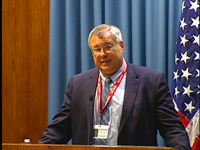The Uncertainty of the "Made In" Label in Today's Global Economy
"If you want to buy an American car, you need to buy it from a Japanese company," said Stephen Carmel, a Senior Vice President at Maersk Line Limited. Carmel spoke about the "made in" label's irrelevance in today's global economy during a February 16 Straight from the Source presentation at Volpe, The National Transportation Systems Center. Carmel explained that a recent Federal Reserve Bank study found that the Toyota Sequoia, from a Japanese company, was found to be made of 80 percent U.S. content and the Jeep Patriot, from a U.S. company was only 66 percent U.S. content.
 Carmel's Straight from the Source talk focused on how advances in transportation and communication technology have created an interdependency of economies, such that "actions in one country produce nearly instantaneous effects in many others." Carmel noted that countries no longer trade what they make for what they don't make but need. "We now trade in order to get what we need to make what we make." He argued that policy is erroneously driven by the "made in" label, which has no relevance today, as we are not completely certain where anything is made.
Carmel's Straight from the Source talk focused on how advances in transportation and communication technology have created an interdependency of economies, such that "actions in one country produce nearly instantaneous effects in many others." Carmel noted that countries no longer trade what they make for what they don't make but need. "We now trade in order to get what we need to make what we make." He argued that policy is erroneously driven by the "made in" label, which has no relevance today, as we are not completely certain where anything is made.
Carmel used a widget as an example to explain his point. He said that a specific widget is manufactured in a variety of places and the "made in" label only denotes where it was assembled. As a result, he concluded that not only is it difficult to identify where supply chain disruptions might occur but how disruptions ultimately could affect the global production system.
"The demise of the meaning of the 'made in' label means we can no longer gauge with any accuracy where the incidence of a specific trade sanction will fall, nor where failures in the global supply chain may manifest themselves." The continued use of a "made in" label, according to Carmel, conveys misinformation that could break the progress of globalization and prove catastrophic. Carmel expanded on this idea as he discussed the evolution of globalization that began with the Corn Laws in England in 1846 and how "the first great age of globalization" came to an end—World War I. For more detail about Steve Carmel's perspectives on globalization and transportation, click here.
Please visit Straight from the Source for more information about Stephen Carmel and other participants in this speaker series.
Above: Stephen Carmel giving his Straight from the Source presentation on February 16. (Volpe photo)
